In 2008, I was on an eight month trip around the world. After working in Australia for a few months, I met up with some friends in Thailand for a few weeks.
As we were having dinner one night, they convinced me to join them in Nepal for a month of trekking and adventures in the Himalayas. I had previously planned to head to Bangladesh and India, but the thought of heading into the mountains with my friends made the decision to change my plans quite easy.
It turned out to be one of the better choices I’ve made, as our time in Nepal was magical. Here’s a quick look back at our time in Nepal, way back in 2008.
Yak Steaks and Momos in Kathmandu
I arrived in Kathmandu after an overnight connection in Dhaka on Biman Bangladesh Airlines. My friends had flown in on Thai Airways earlier that day, and we planned to somehow meet at the airport.
After waltzing through immigration without getting a visa (the border officers were on a tea break), I grabbed my backpack and walked out into a crowd of people at the exit. A lovely Nepalese man was holding a sign with my nickname on it, which suggested my friends had arrived safely before me.
Our driver navigated through to the Shangri La Guest House in Thamel, which served as our home base for the next few days. There was an interesting mishmash of characters at the guest house, and the four of us crammed into a small room to save money.
Thamel is the heart of the tourism sector in Kathmandu, full of shops with trekking gear and packed pubs with local musicians playing Western classics. You’ll also find shops selling beautiful wool goods, and a strangely large collection of Tintin memorabilia in every store.
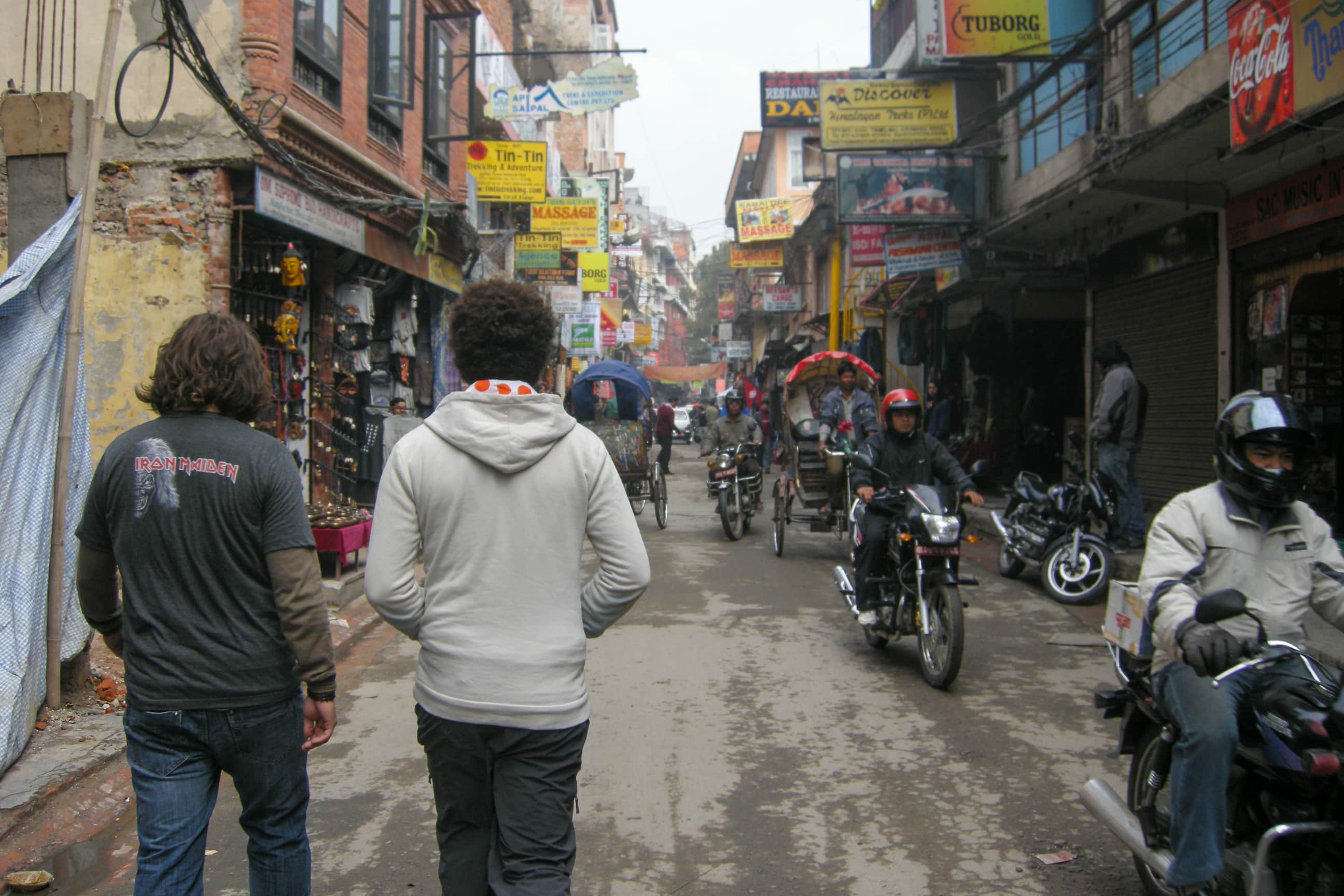
As we prepared to head into the mountains, we enjoyed walking the streets, eating momos, drinking chai, and enjoying the occasional yak steak for a candlelight dinner. The power would often go out, and we’d have candles brought out to light up the dinner table while someone else ran to the rooftop to fire up a generator.
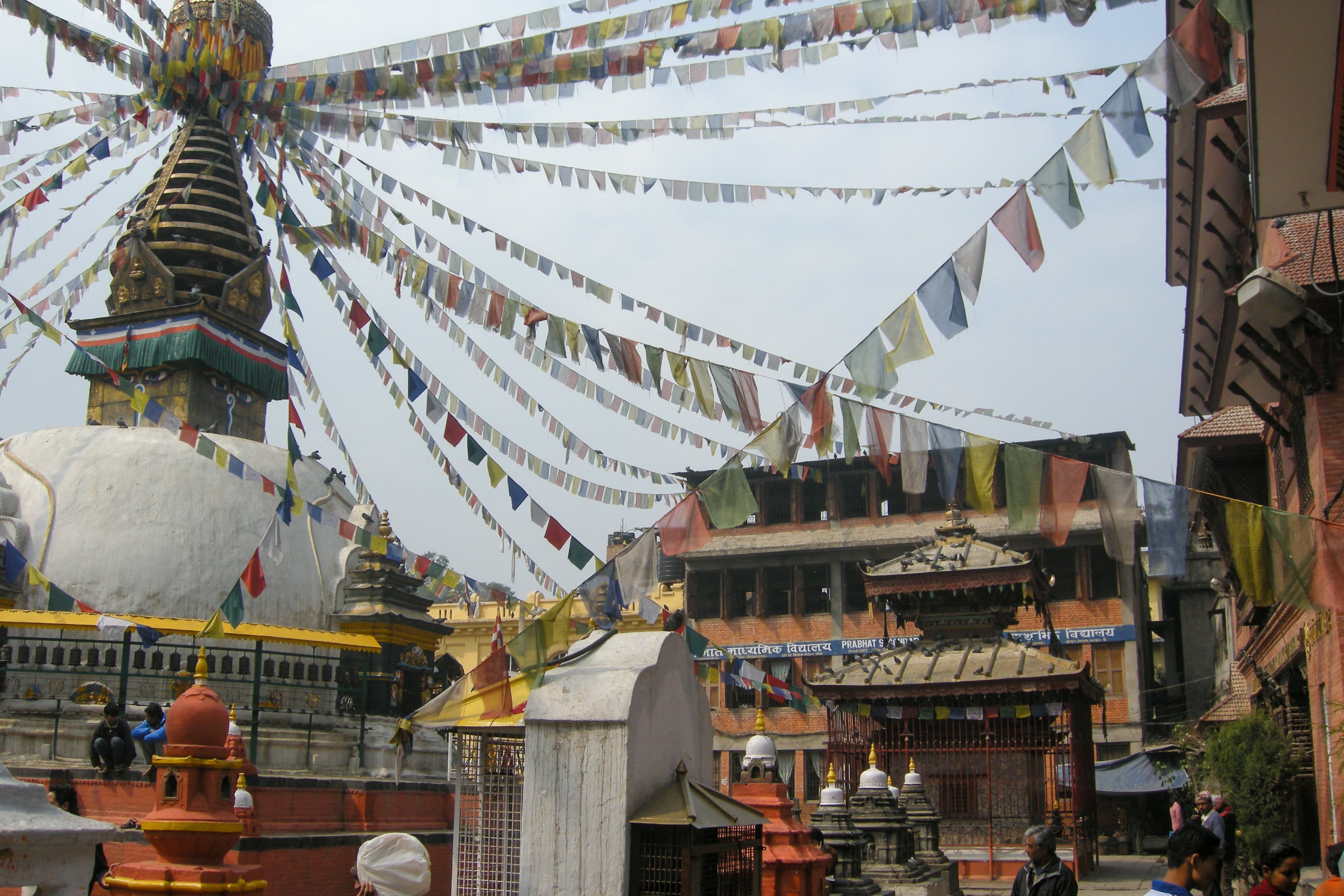
Our trekking company, First Environmental Trekking, arranged for our permits and ensured that we had sufficient gear. We stored some extra clothing with them that we wouldn’t need on the trek, even though we decided that packing a few pints of Guiness for our friend’s birthday was necessary.
The day before we left for the mountains, we were told to head to the Pashupatinath Temple for a special holiday. It turns out we were in Kathmandu during Maha Shivaratri, one of the biggest festivals of the year.
As we approached, the streets were packed with people. Every now and then, crowds would make way for one of the many Sadhus (Hindu holy men) who was making his way to the temple.
The entire experience was fascinating, and we were in awe of the crowds of people around the temple, the cremation ghats on the Bagmati River, and the Sadhus being revered as though they were celebrities.
As we finished packing our bags back at our guest house later on that evening, we were teeming with excitement about the adventure that was ahead of us.
Heading Up to the Thorong La Pass
A bus took us on a nerve-wracking journey from Kathmandu to Besisahar. Our bus driver navigated along winding roads and past vertigo-inducing cliffsides mere inches from the side of the road.
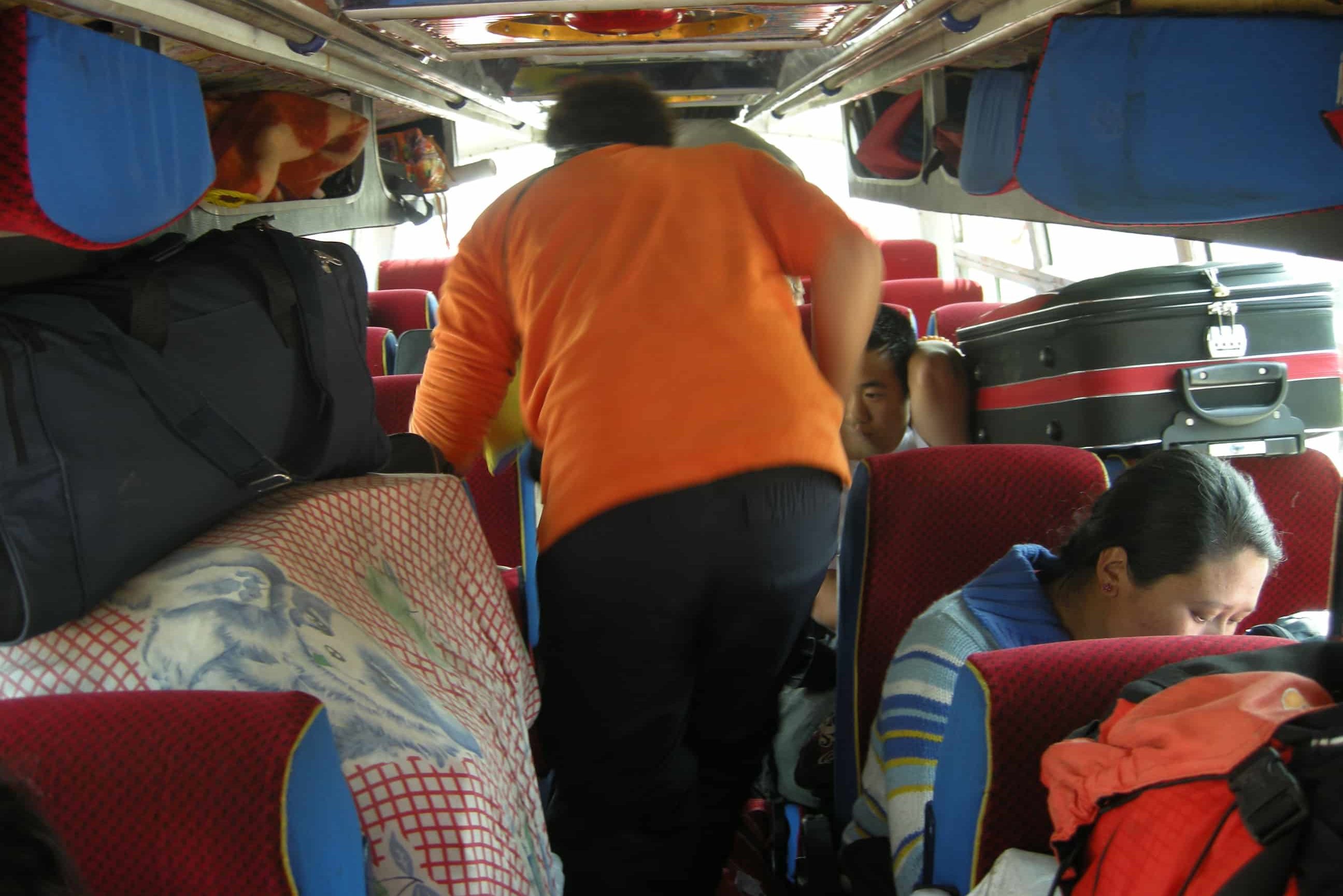
I felt that we’d narrowly escaped death numerous times before the trek had even begun.
Armed with a map and a simple guidebook, the four of us hit the trail and thus begun our 215km journey by foot into the Himalayas.
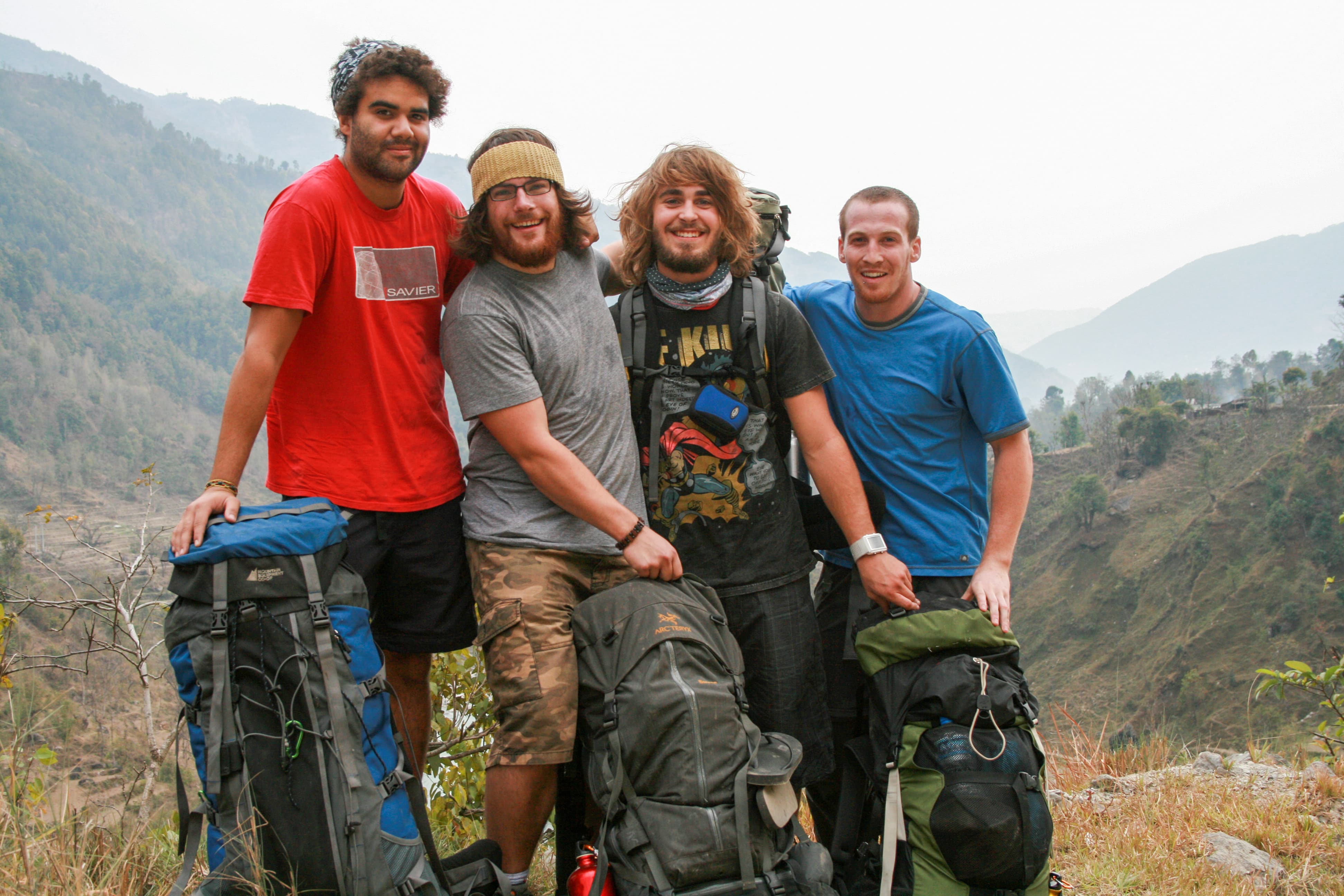
I wasn’t really sure of what to expect on this trek. I’d never done something of this magnitude before, and since I hadn’t done any planning, I was really just tagging along for the ride.
The first few days of the trek brought us through forests and many small villages. Our legs and lungs got plenty of work, as we’d summit a large hill only to lose all the altitude we’d gained, before gaining it all back again by the end of the day.
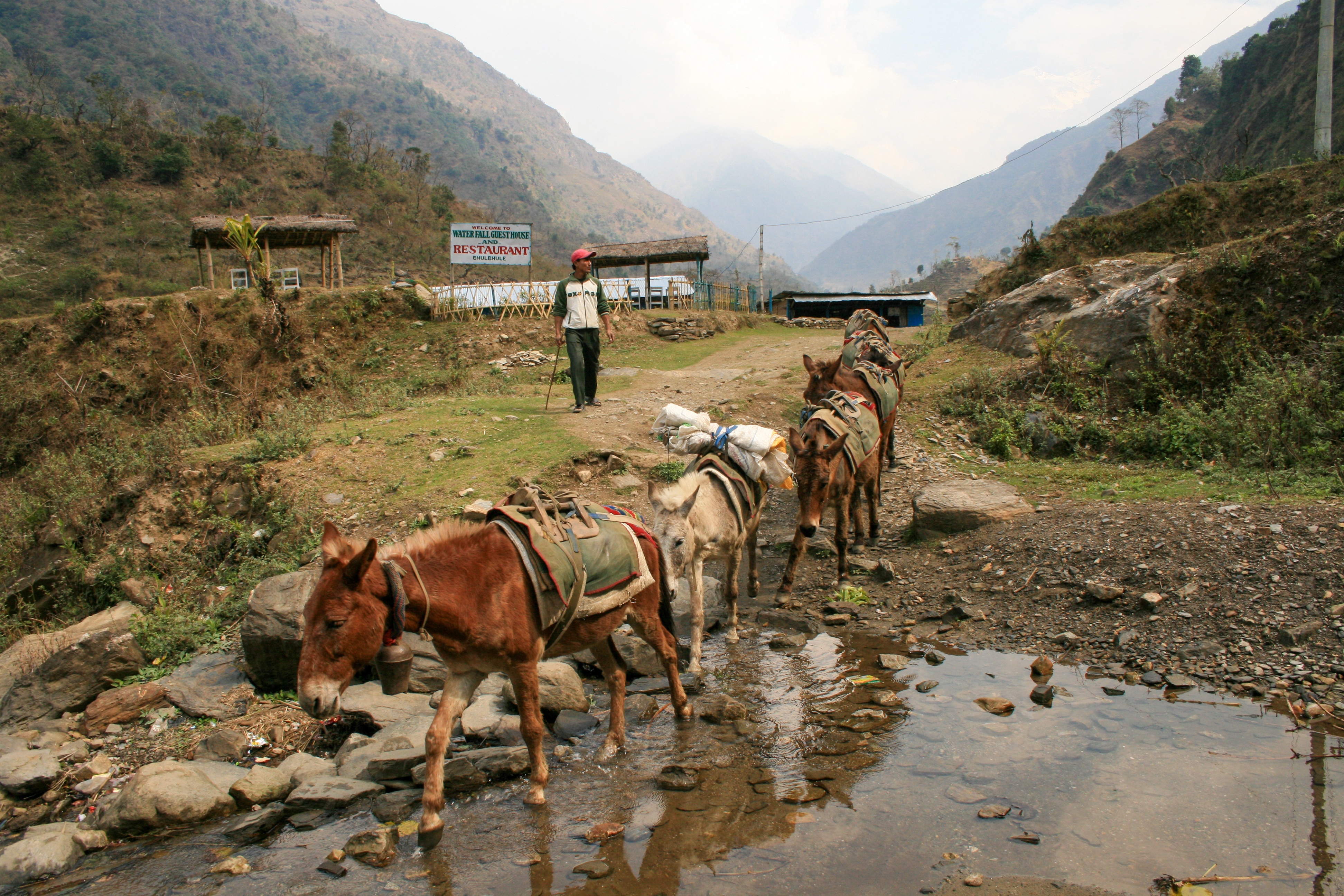
We aimed to cover around 15km each day, although we knew that our pace would have to slow once we reached higher altitudes to avoid getting altitude sickness.
The trails varied in width and footing. At one point, our path narrowed and we had to carefully walk across without a railing to avoid falling a couple hundred metres to our death.
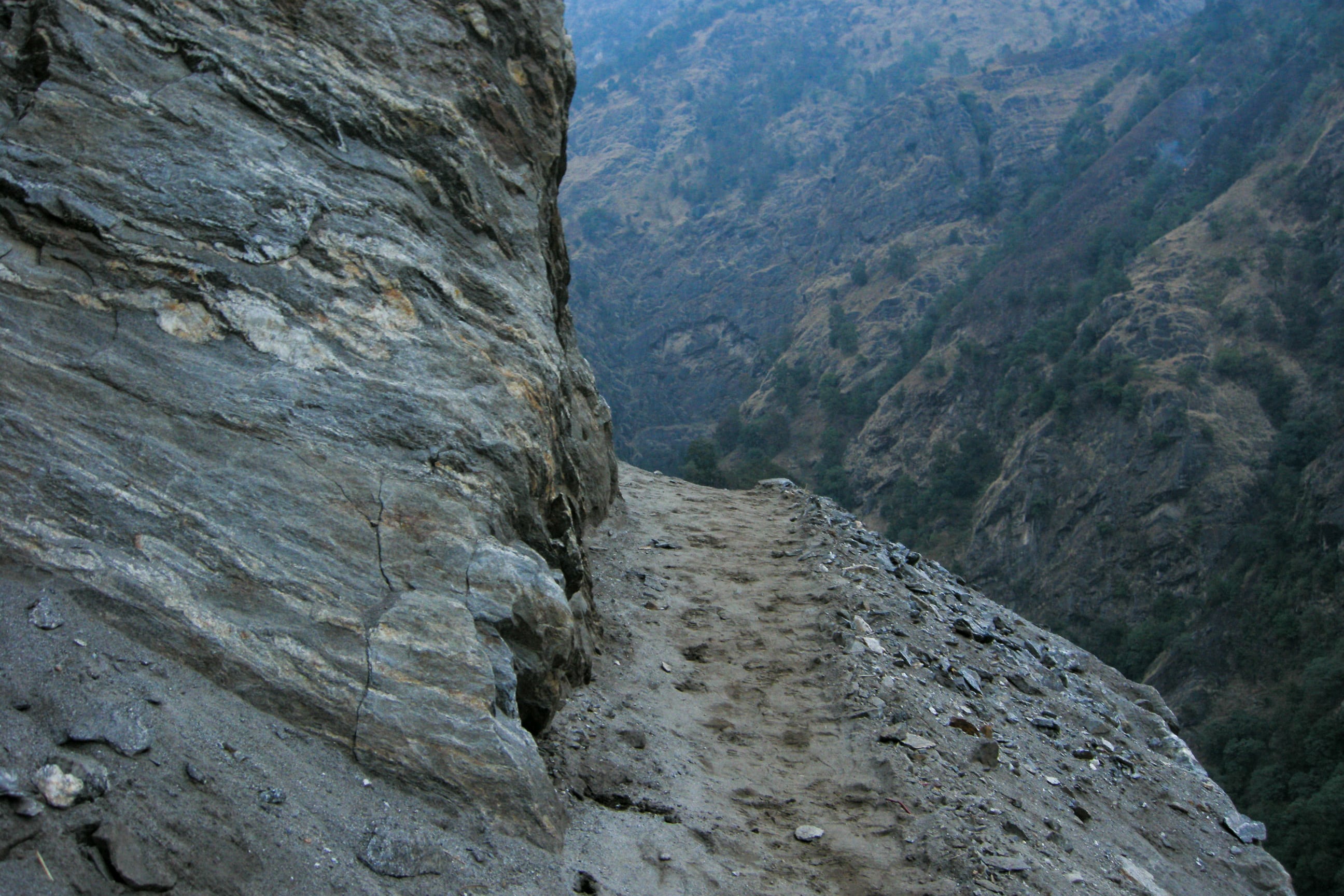
These parts of the trek were as mentally challenging as they were physically demanding. While it wasn’t a very far distance to cover, it felt like ages as we each took turns slowly stepping along the path, staying quiet so as to let each person focus on the task at hand.
We settled into a daily routine of hiking, stopping in a village for lunch, and then trekking until the late afternoon. Using our map, we’d approximate our destination for the day, although that changed depending on how far we made it.
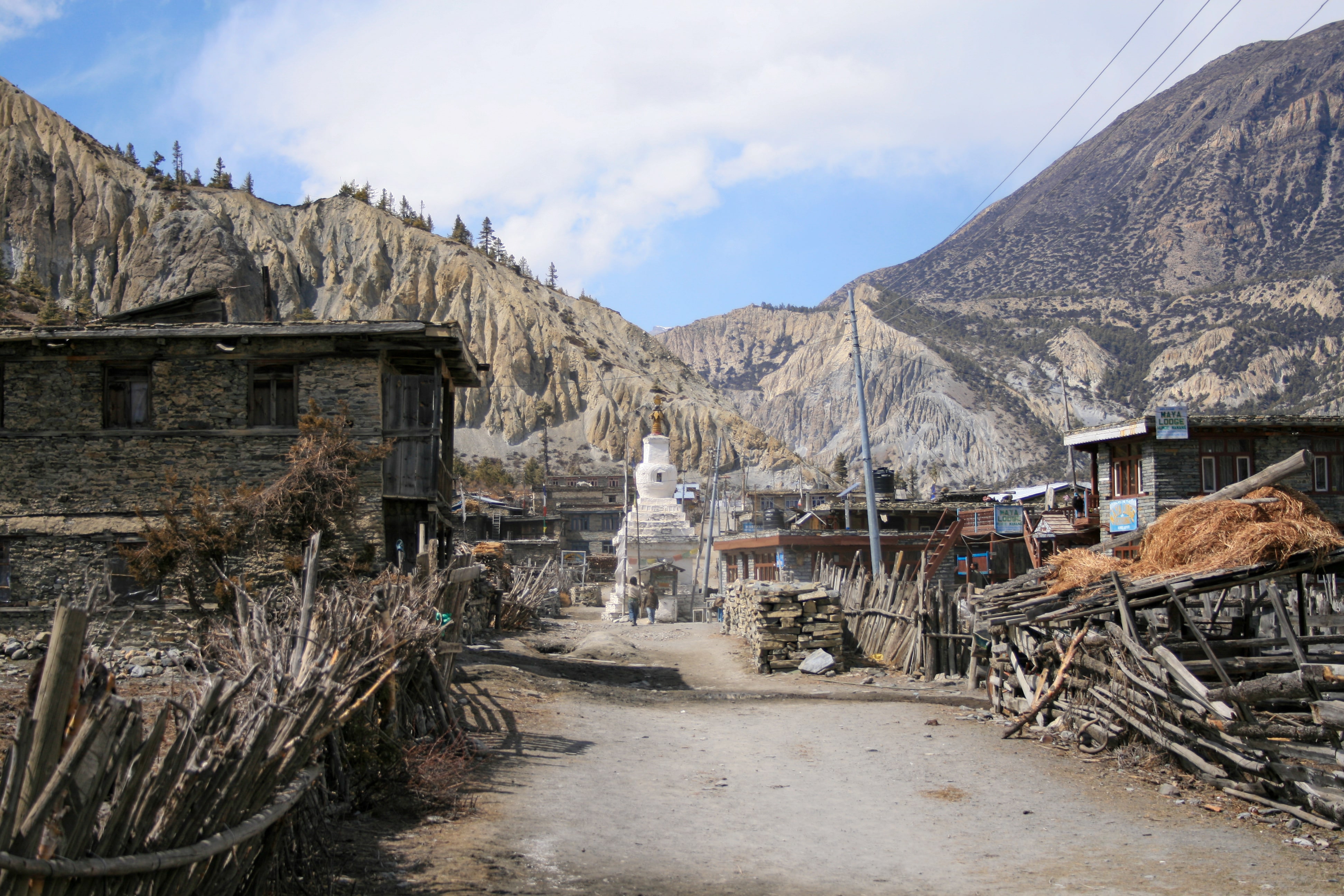
The tea houses where we stayed weren’t reserved in advance. In each village, we simply chose one that looked decent, or whose family corralled us in first.
Our accommodation usually cost between 50 cents and $1 per night, which was an absolute bargain. Each guesthouse cooked meals that again cost a few dollars at most, including a bottle of Everest beer and a chocolate bar for dessert.
As we gained altitude, our surroundings changed as we approached the alpine line. During the day, we’d walk past herds of yak heading to find some greenery. As we encountered locals and porters heading the opposite direction, we were greeted warmly with “namaste” each time.
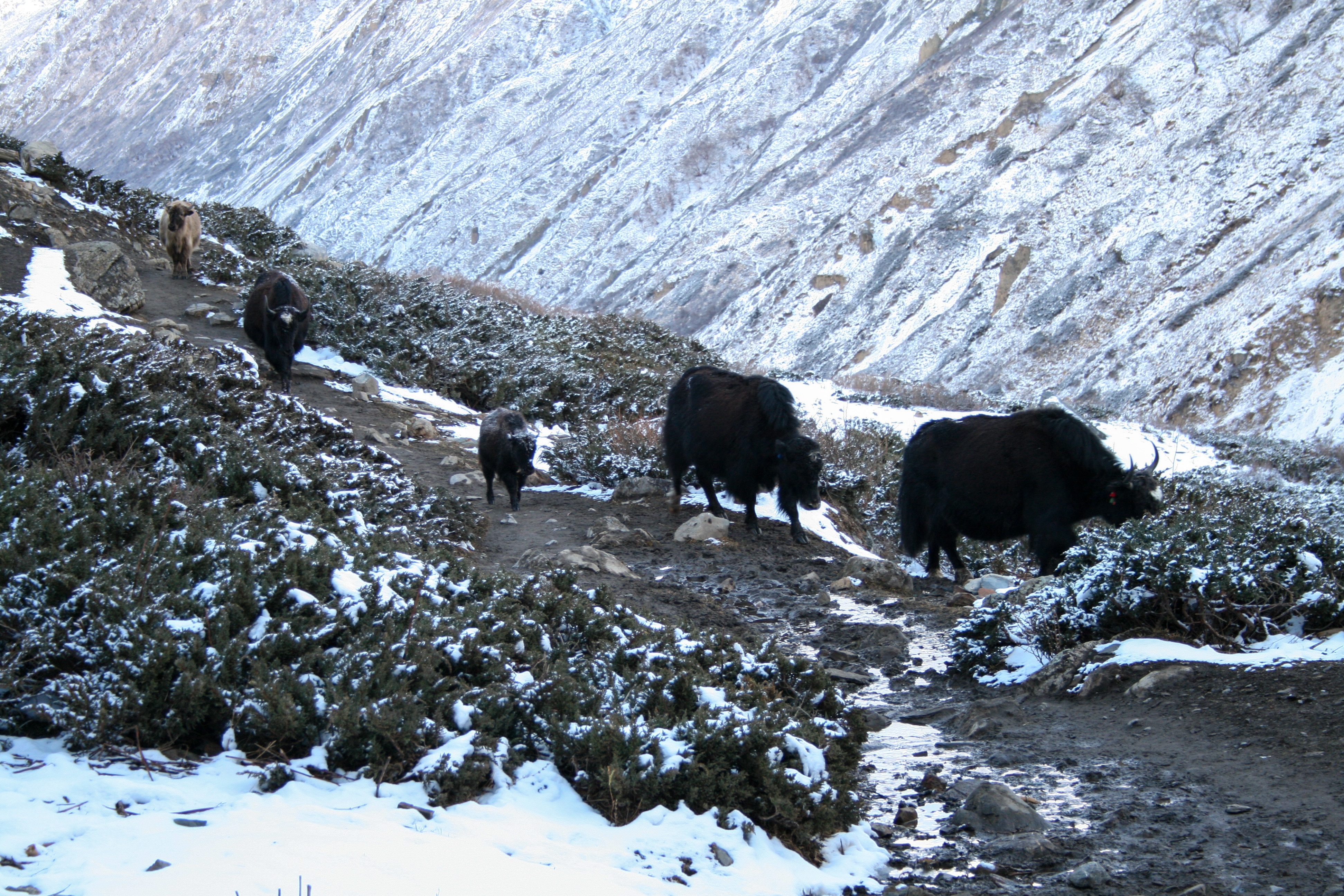
Sunglasses were key to avoiding snow blindness, as the powerful sun reflected off of the snow. As a fair-skinned individual, I also used zinc cream to prevent nasty sunburns on my face.
As we gained altitude, the air became thinner and our trekking days were shortened. We took a day in Manang, at 3,500m, to adjust to the altitude, carefully monitoring for symptoms of altitude sickness and also enjoying a bit of rest.
By this point, we’d come to know that it’s basically impossible to take a bad picture in Nepal. Everywhere we went, the backdrop was absolutely stunning.
We stopped for a snack at a tiny shack one day and took a group picture, only to realize later that it was one of the most stunning views we had during the whole trip.
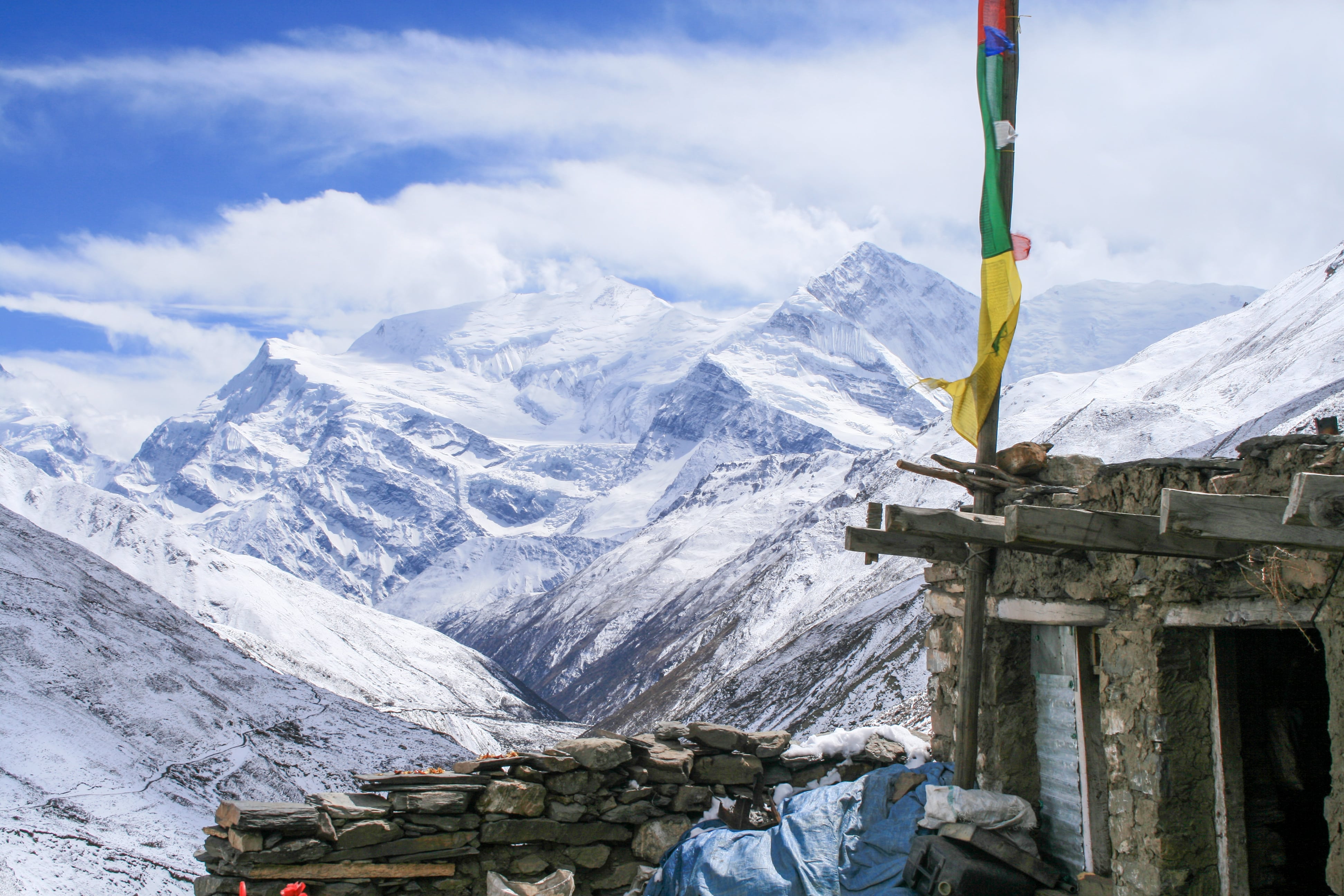
Thorong Phedi was our last stop before heading over the Thorong La pass, which was the highest elevation we’d reach on our trek. We spent a night under wool blankets trying to stay warm, as it was fairly freezing at 4,500m.
We were blessed with outstanding weather on the most difficult day of our trek. From Thorong Phedi, we gained almost a vertical kilometre of altitude to reach the Thorong La pass at 5,416m.
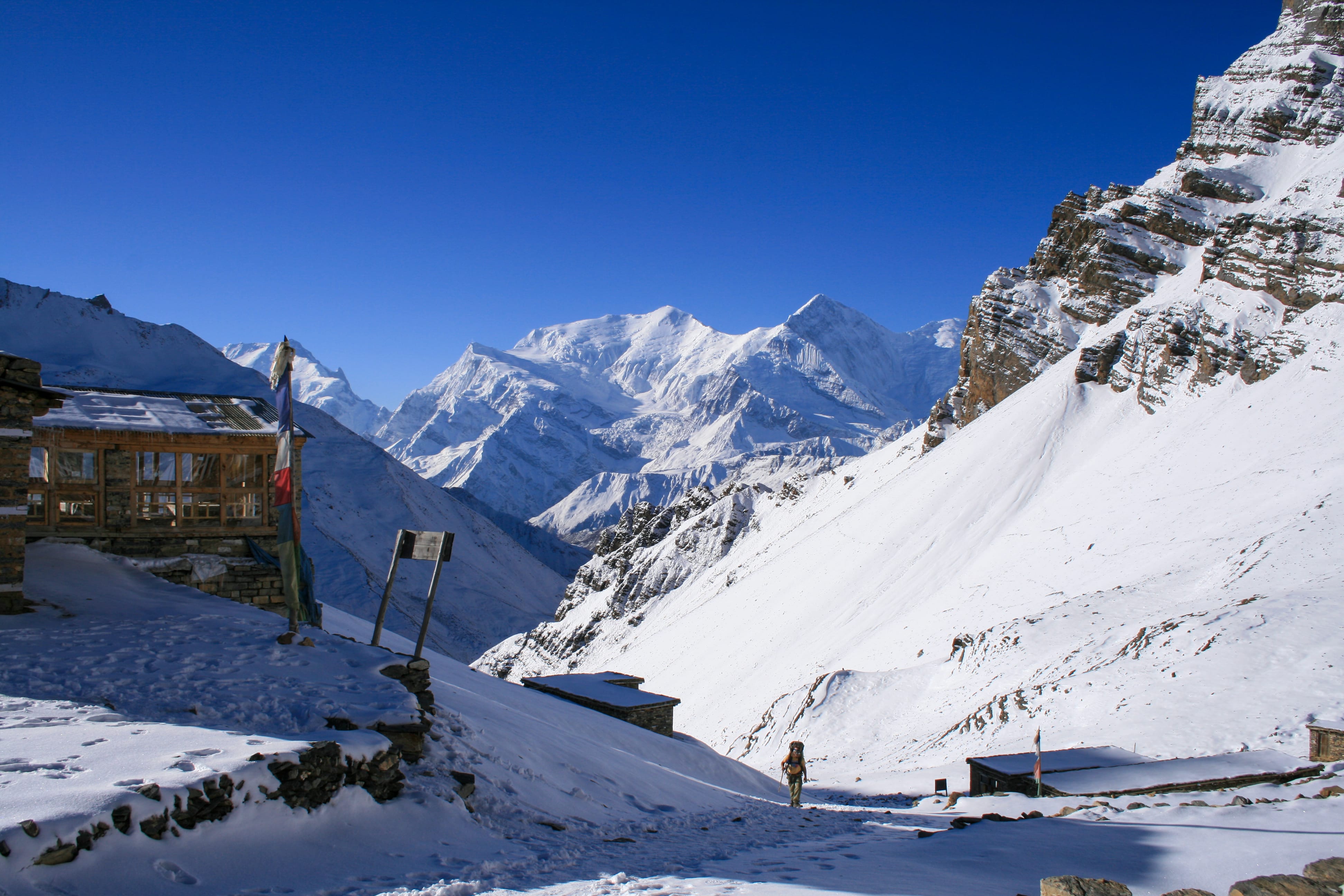
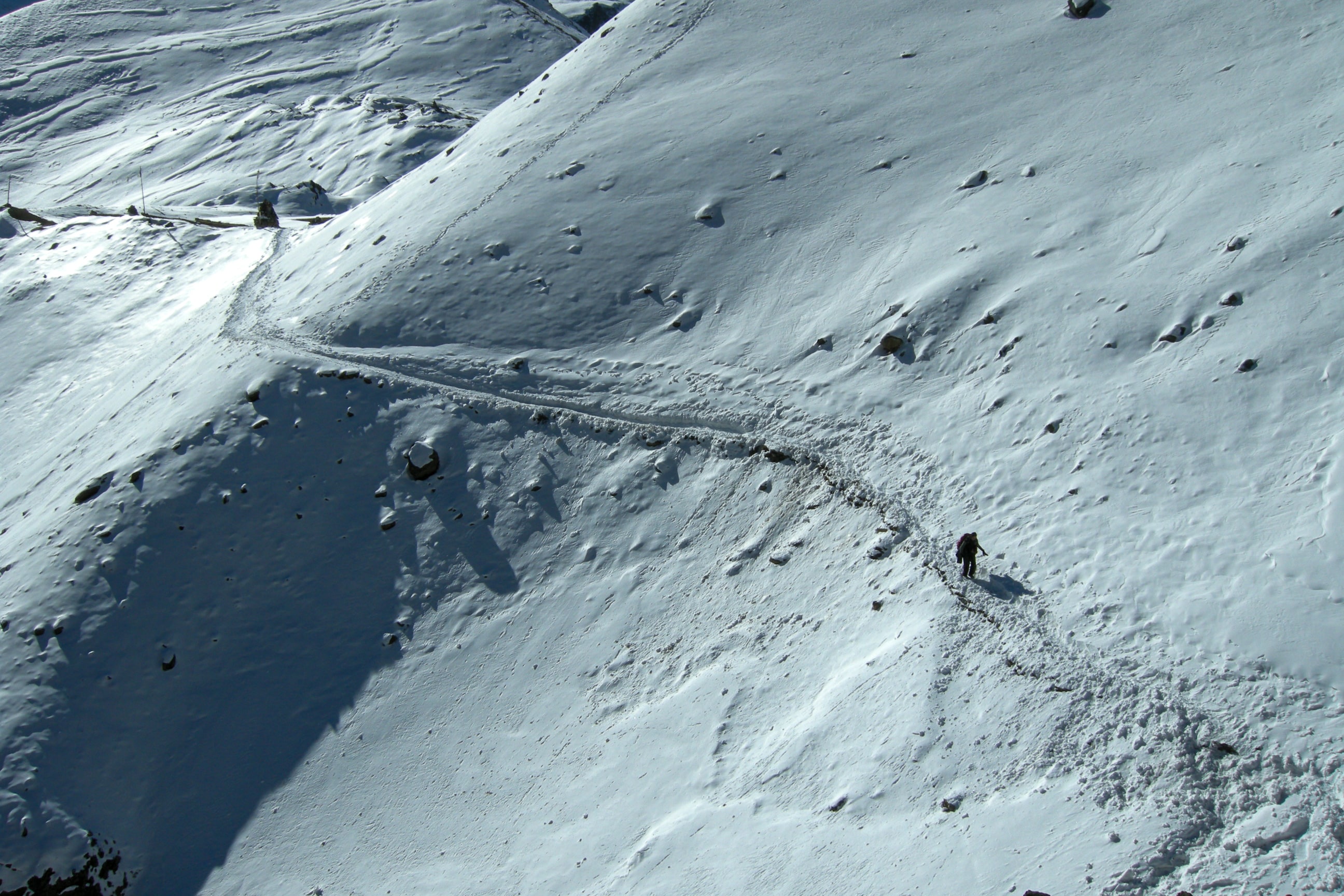
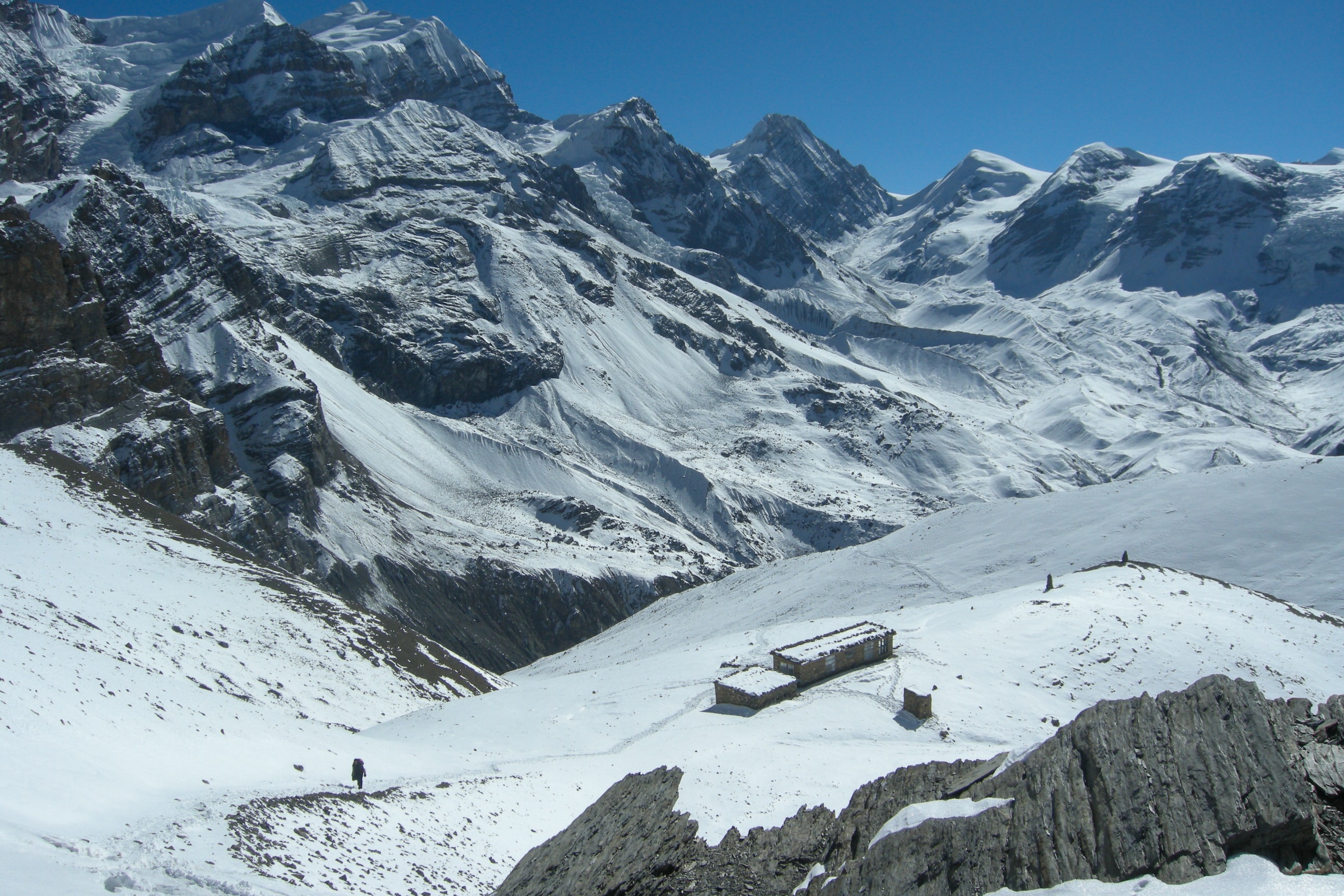
It took a few hours of steadily climbing up a massive hill before we reached the pass. It felt as though we were on the top of the world as we gazed out into the vast mountain expanse in the Himalayas.
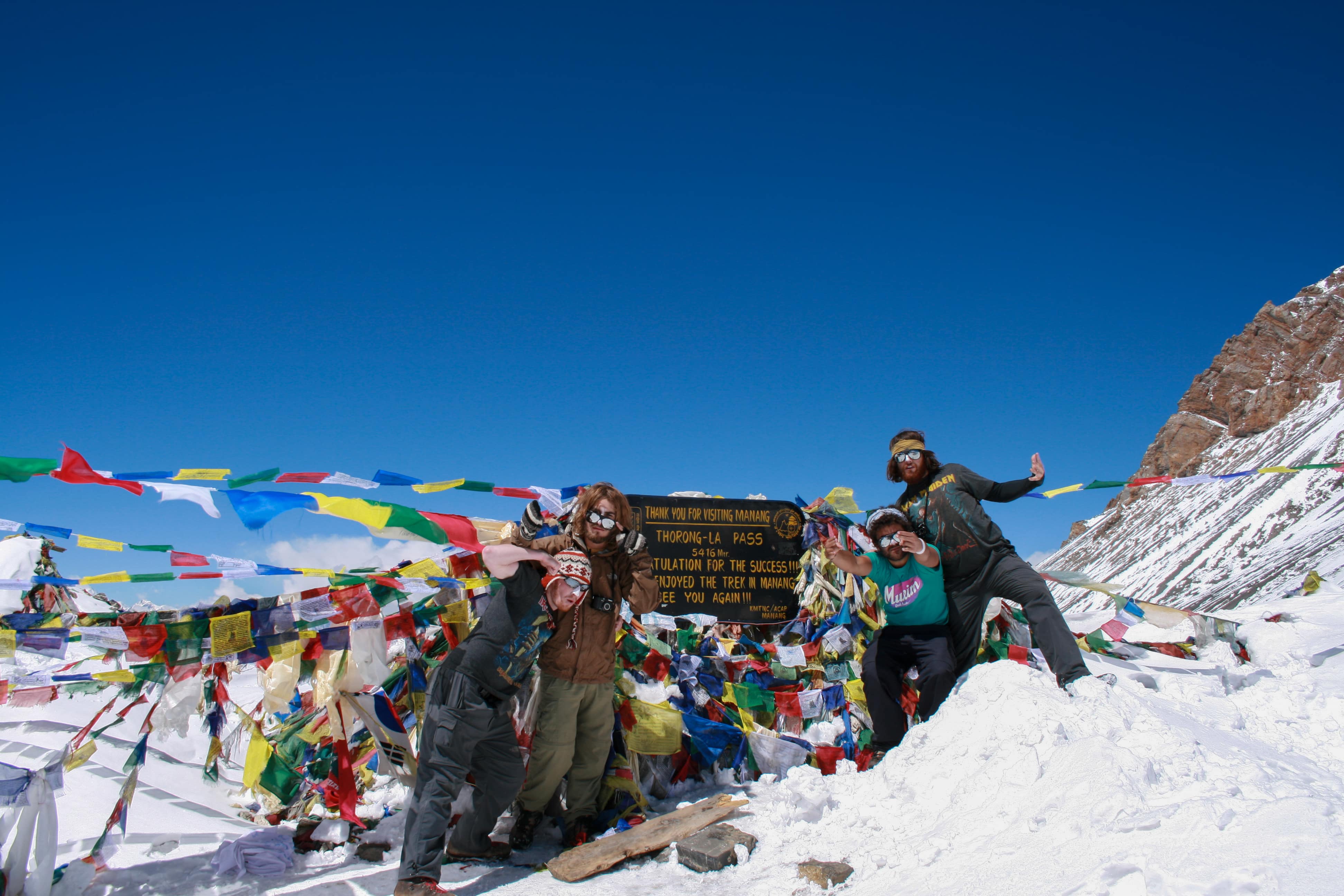
At the end of the day, we dropped down to around 3,750m when we arrived in Muktinath. At our guest house, we celebrated the day with a couple of bottles of Everest beer as we sat around a table with an oven underneath to keep us warm.
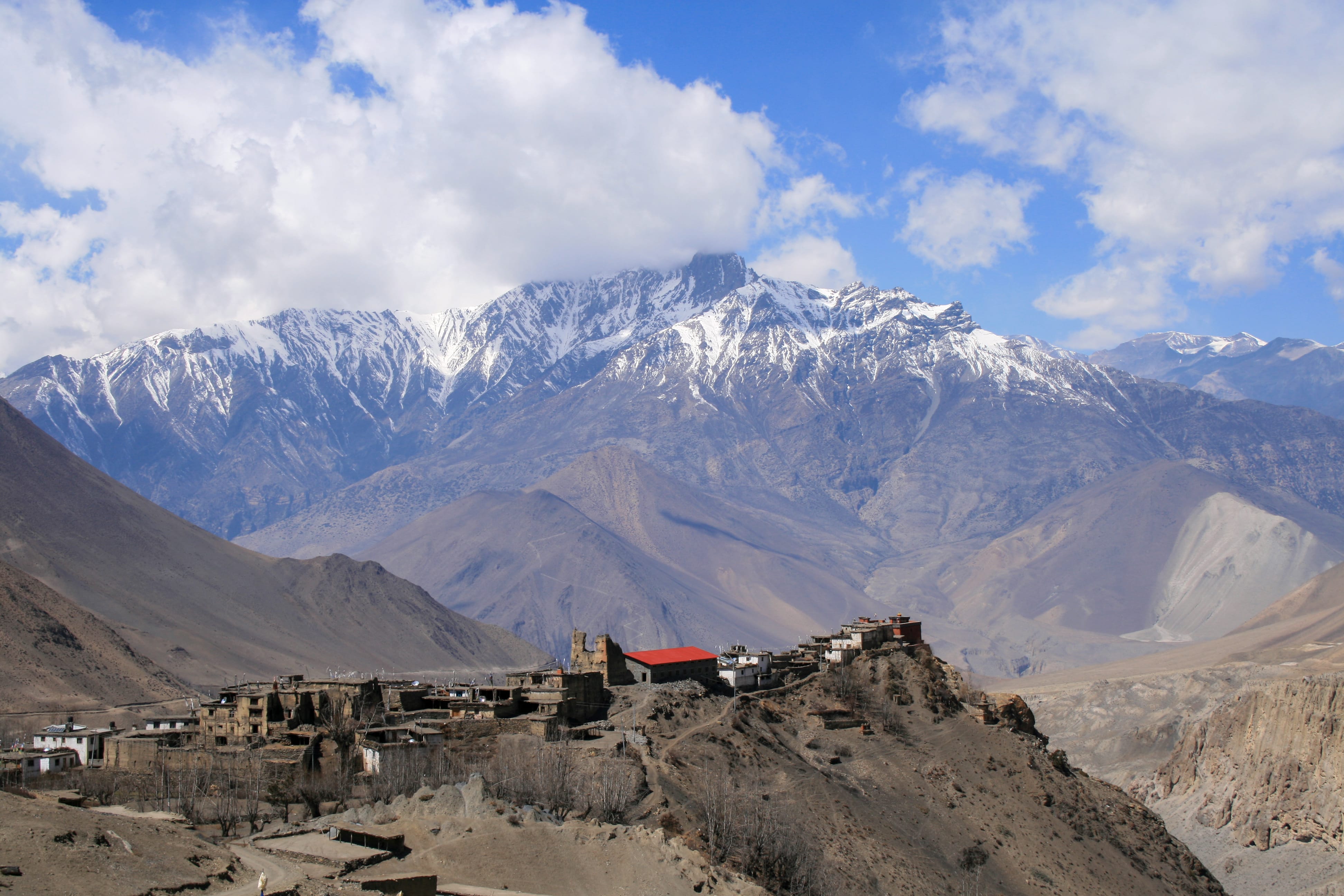
Cruising Down by the Kali Gandaki
The remainder of the trek was more leisurely than the first part. Knowing that the hardest part was over, we slowed down the pace and enjoyed ourselves along the way.
In Jomsom, we finally cracked open the pints of Guinness that we cursed at at the end of each day, as we celebrated our friend’s birthday. After a delicious meal of yak steaks and French fries, we played cards and listened to music before nodding off to sleep.
Our trekking days took us past waterfalls, along lake beds, and across bridges that spanned valleys. The Kali Gandaki river ran along much of the trail on this side of the pass.
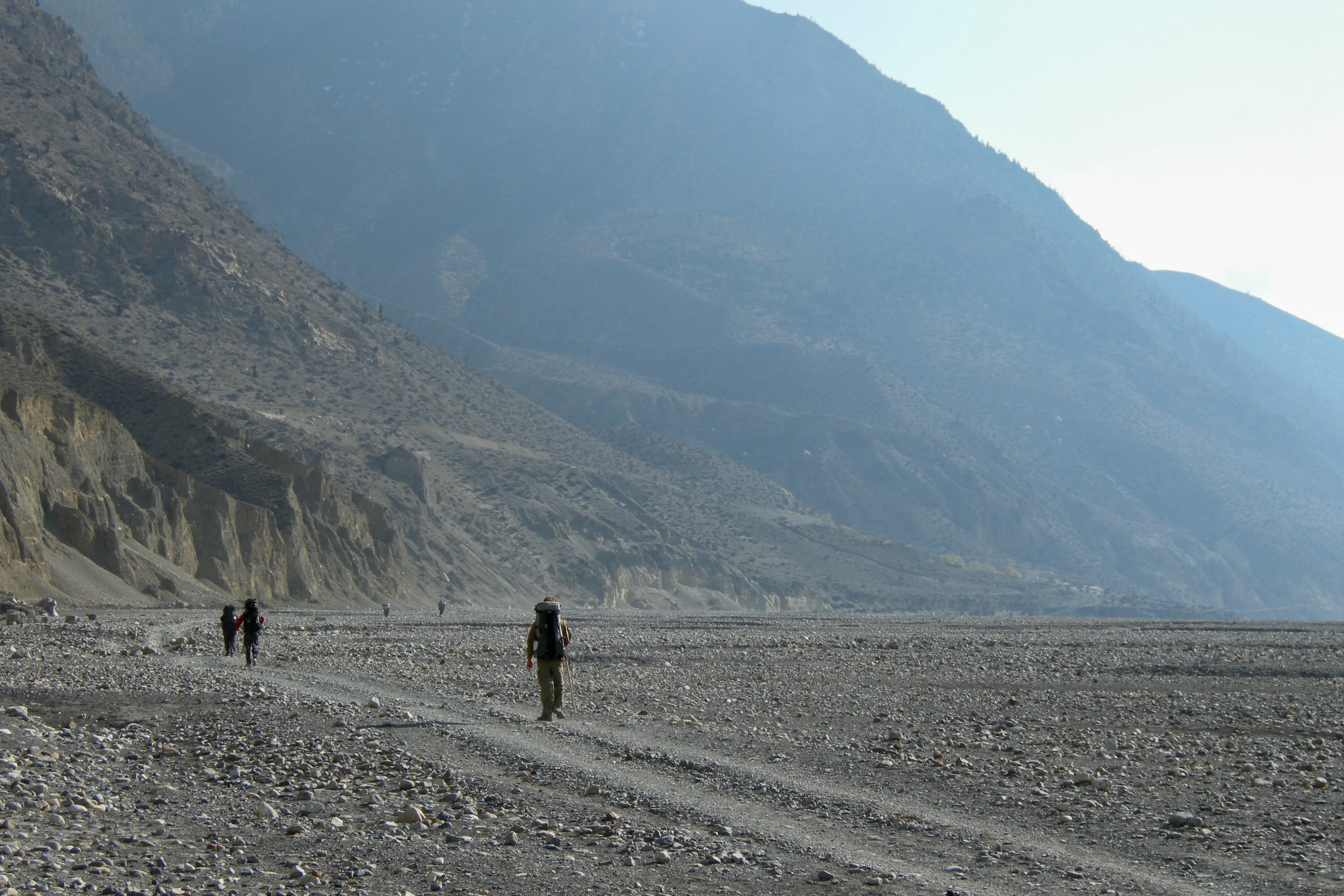
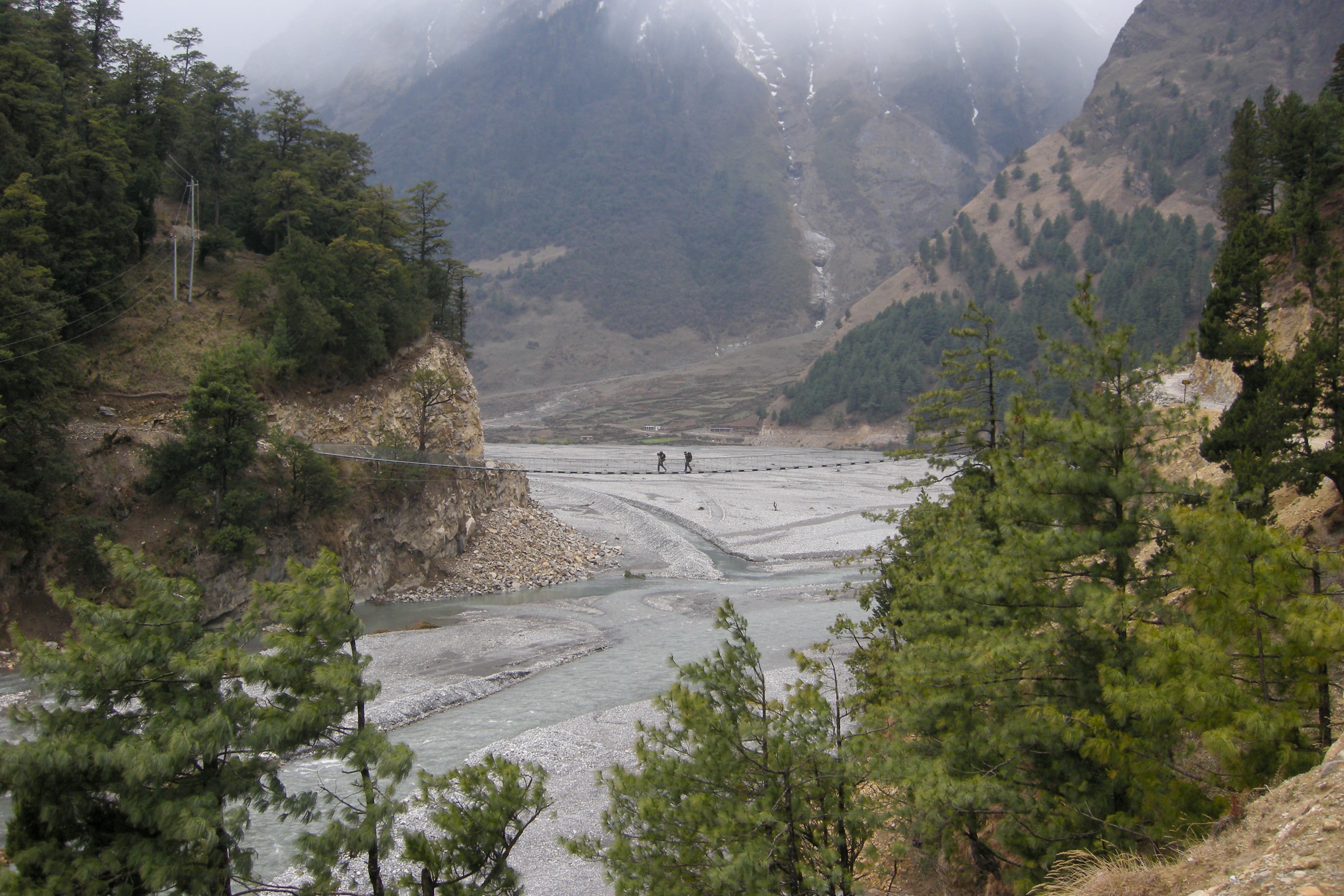
Our backpacks paled in comparison to the loads some locals were carrying on their backs. There is now a road that runs all the way up to Muktinath, which would make transporting large quantities of heavy goods much easier.
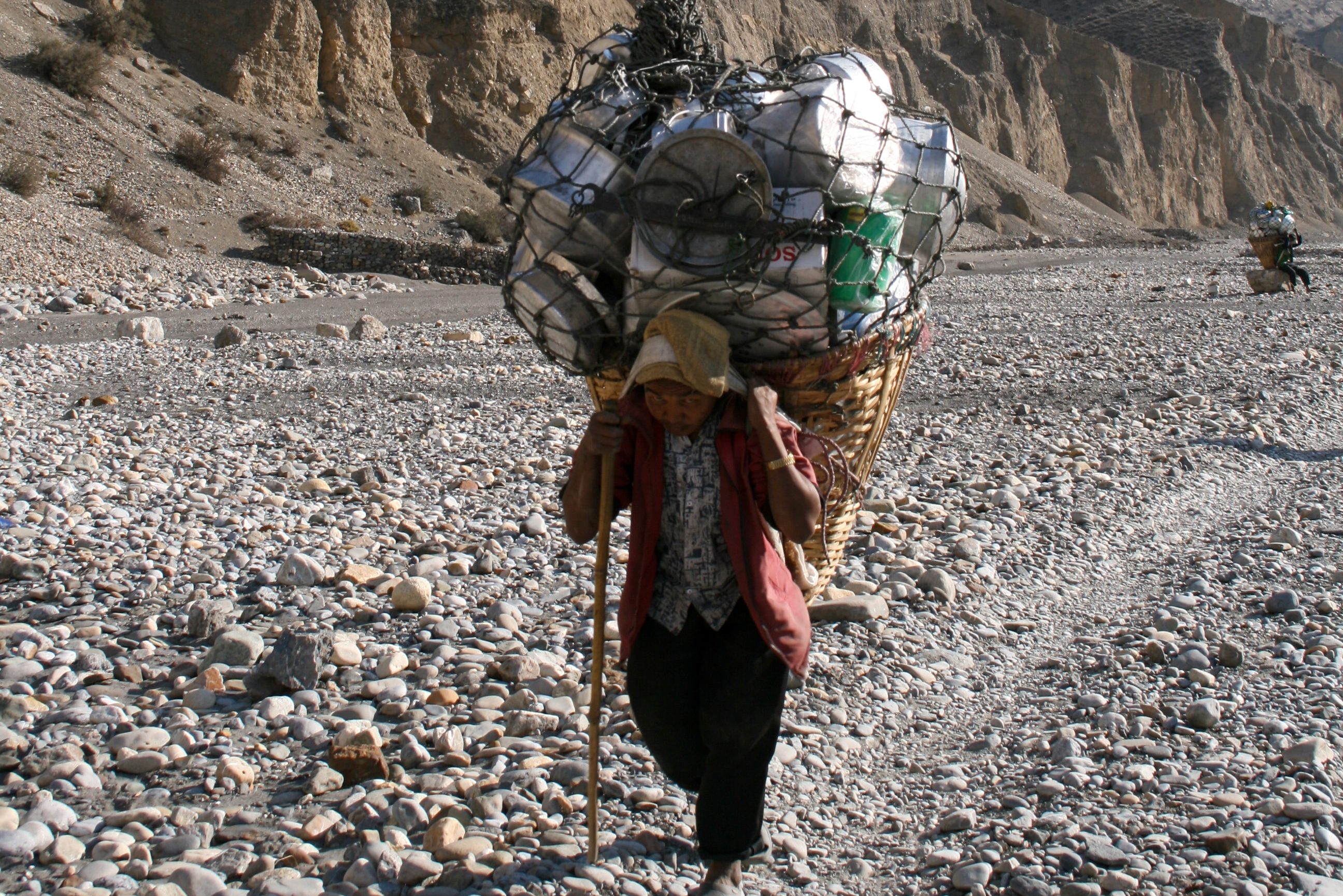
The landscape around us transformed with each day, but it was gorgeous everywhere we went. We also enjoyed seeing animals with CDs as a decoration.
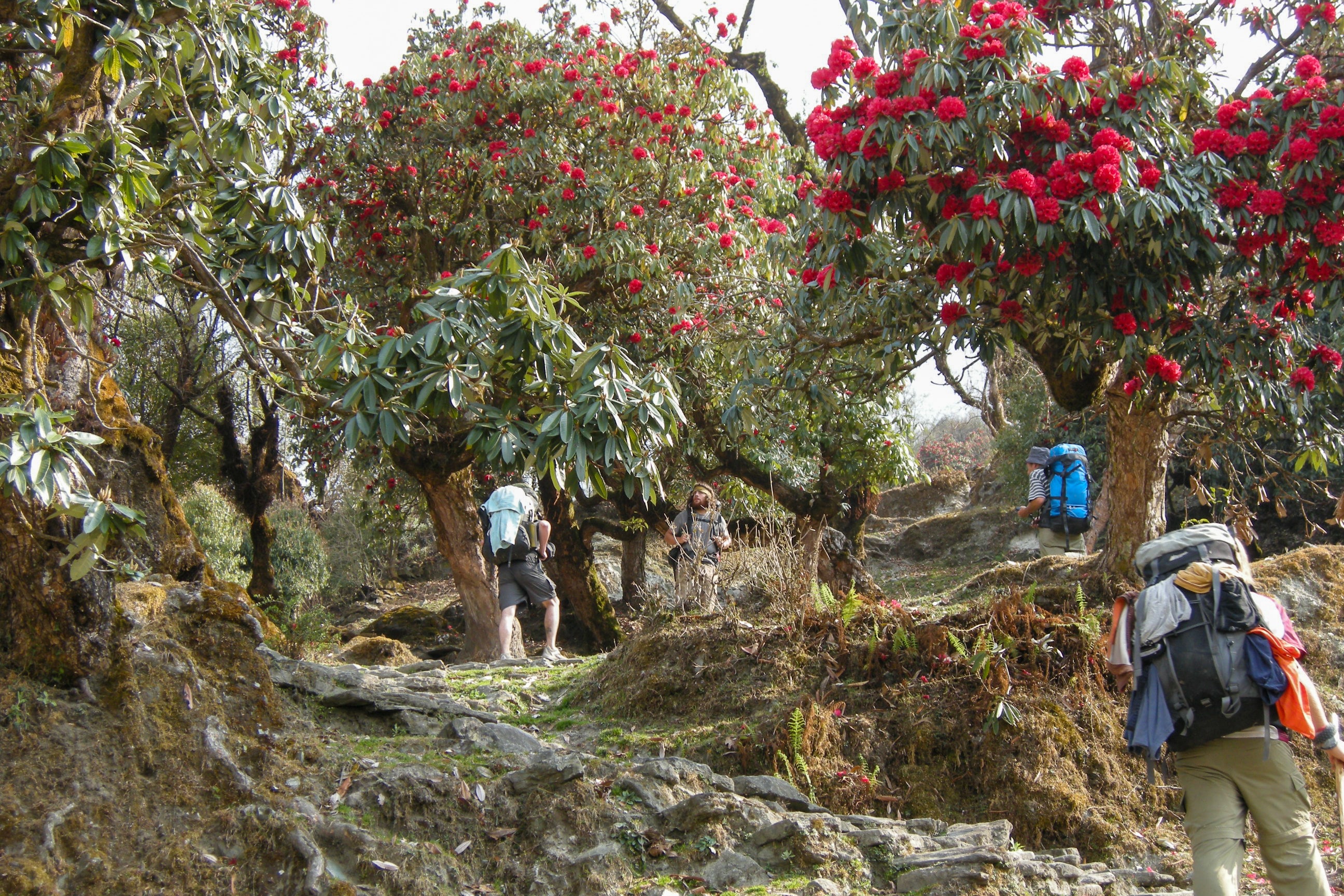
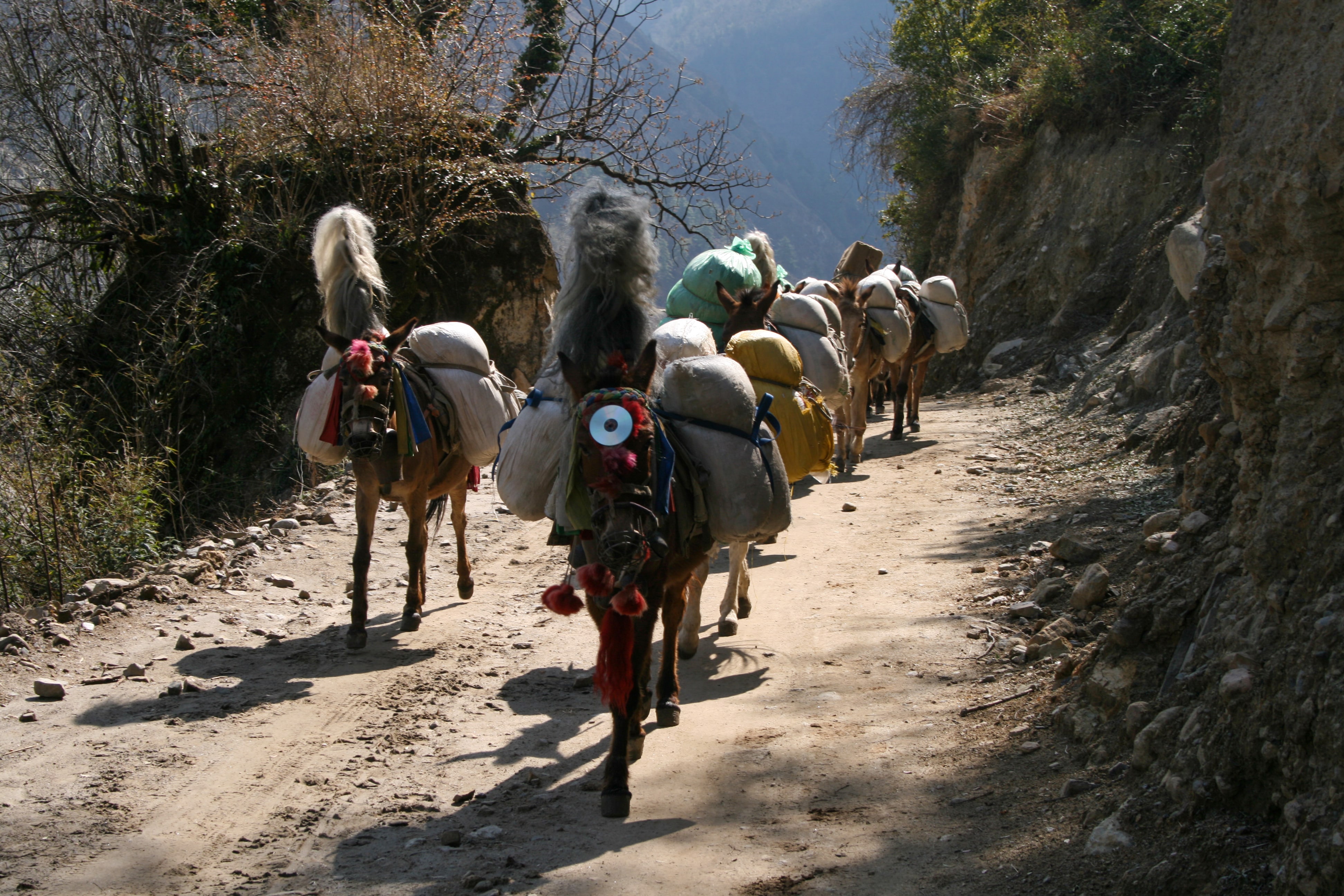
There was a hot spring near our guest house in Tatopani, and we opted to spend a few days soaking our sore muscles in the hot spring, drinking sea buckthorn juice, and eating chocolate bars to build up some calories.
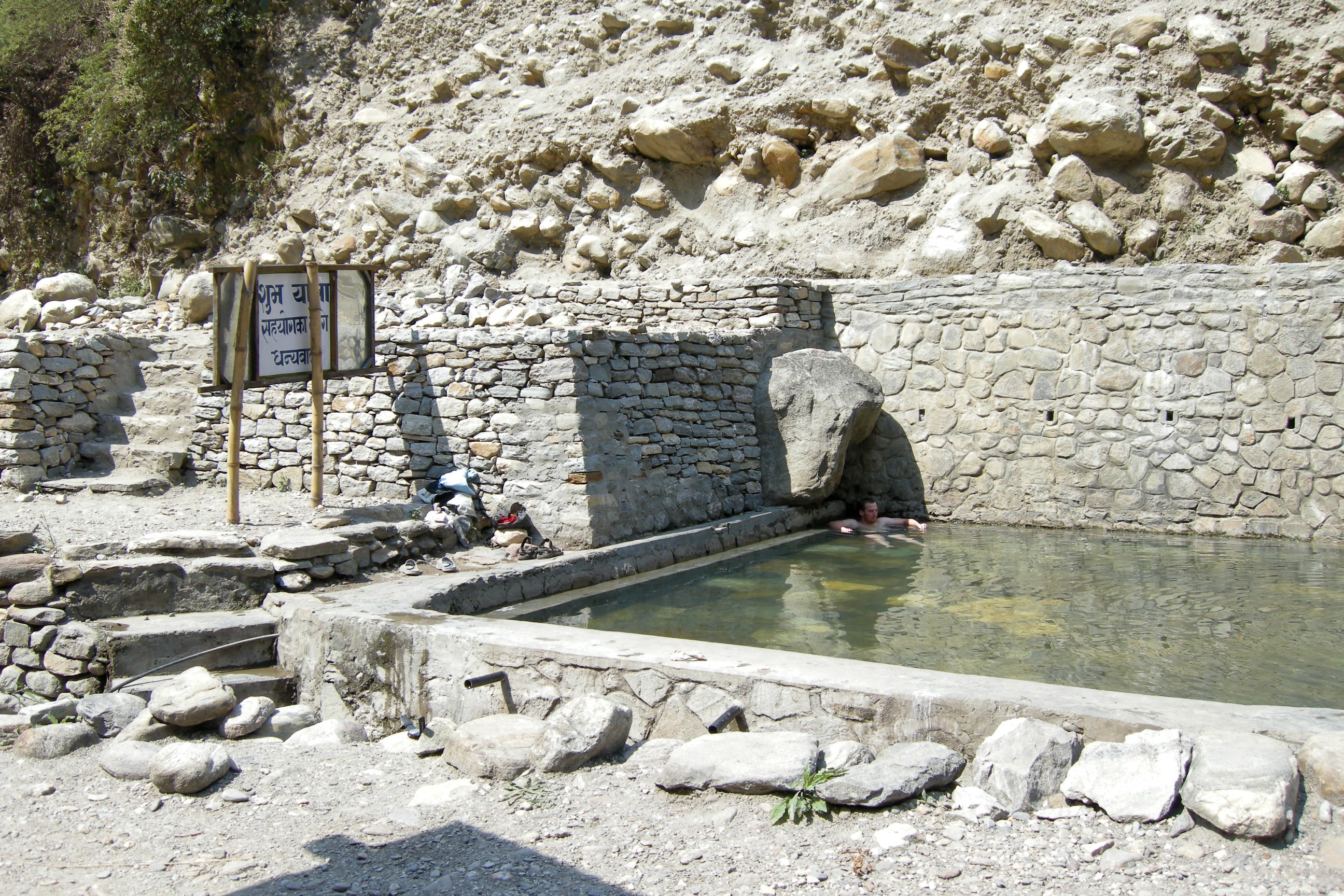
Our last taste of altitude gain came when we woke up at the crack of dawn to watch the sunrise at Poon Hill. After a headlight lit hike up to the peak, we were treated with a picture perfect sunrise over the Annapurna and Dhaulgiri ranges.
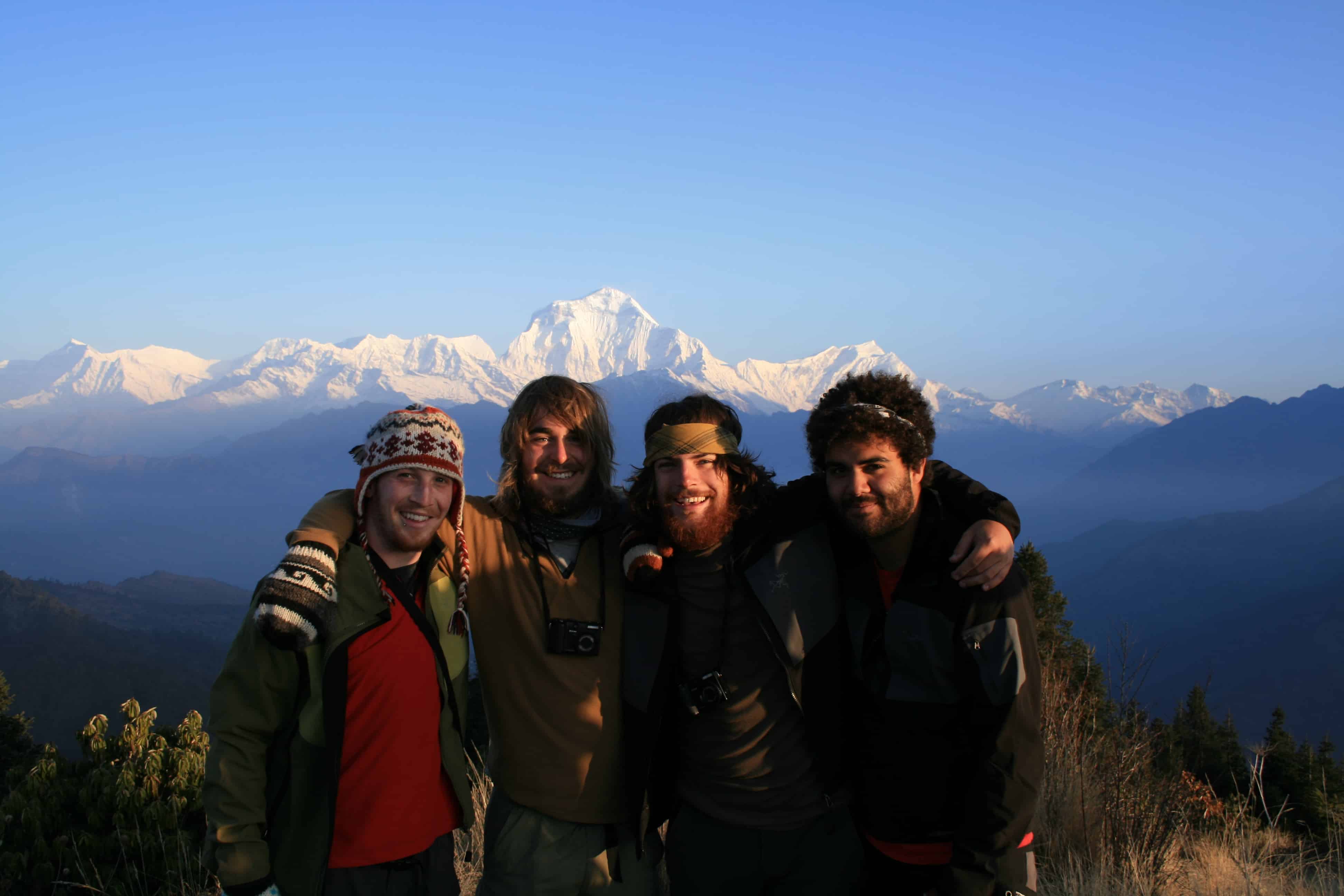
Our adventure in the Annapurnas came to an end as we reached a road near Birethanti. We’d all survived the trek, and had an absolute blast doing so.
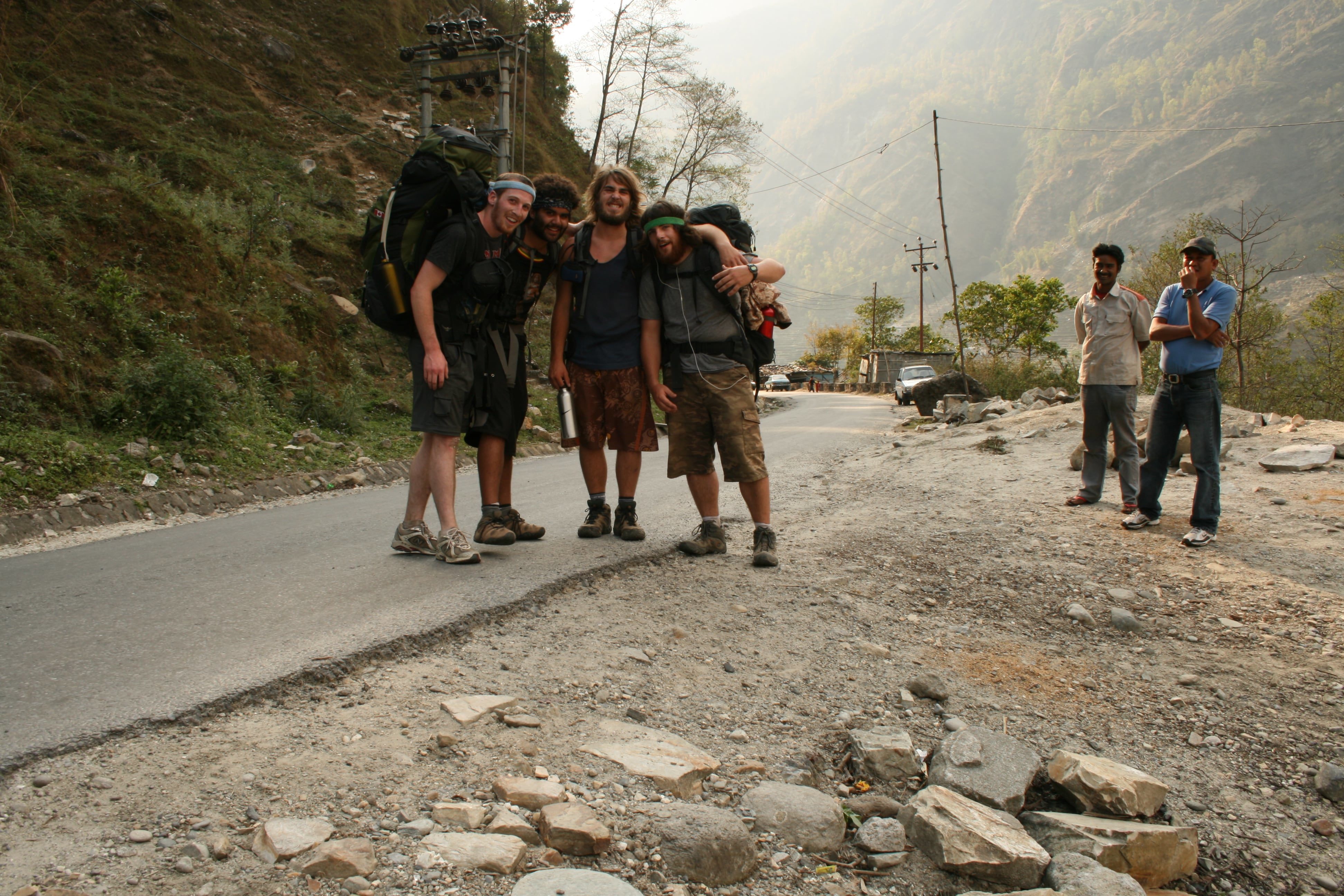
We loaded our bags into a taxi and headed for Pokhara to get some much needed haircuts and continued the celebration.
Conclusion
I often think back to this trek, and it’s one of the best experiences I’ve had travelling. Nepal is a fascinating country, and I’ve been longing to go back ever since my last trip 14 years ago.
I imagine that a lot has changed in the country since 2008, but I’m sure that the country is just as charming and magical now as it was back then.
Of course, there’s a lot more that goes into planning for a trek in Nepal than what is in the above article. If you’ve ever dreamed of heading to Nepal, I’d strongly encourage you to plan that trip and make it happen – you certainly won’t be disappointed.











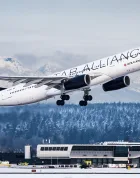
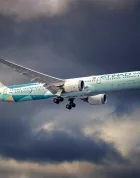


Fantastic article. I always get excited when I see T.J. dropped a new post.
You are so inspiring T.J ! My wife and I love your posts !
Keep up the fantastic writing.
From your reader and neighbor (Victoria BC) Dave